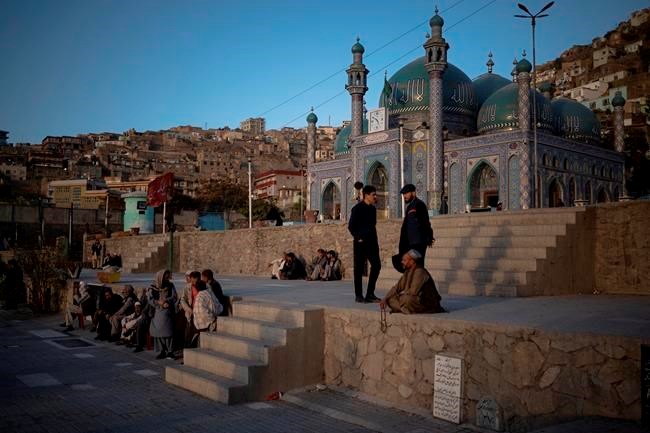OTTAWA — As a Canadian Forces combat engineer in Afghanistan, Corey Shelson's life revolved around a series of life-and-death calculations — plotting the safe movement of his comrades around hidden roadside explosives and other threats.
Today, Shelson's main preoccupation as a civilian consultant has become how to help protect and eventually move 1,700 Afghan interpreters and their families from the refuge of Kabul safe houses to safety outside Afghanistan and eventually to Canada.
On Friday, those safe houses are set to close because the money keeping them open will run out. That could leave their occupants at the mercy of Afghanistan's new Taliban rulers, who stormed back to power this summer.
By Shelson's reckoning, keeping them open — and the hope of eventual escape for their occupants — can be measured by a simple dollar figure: $5 million is needed by Friday.
Shelson says that's because the safe houses cost about $20,000 to $30,000 per day to operate. He says the tab has been ticking higher and higher because the federal Immigration Department has been too slow to approve travel documents for Afghan interpreters.
Veterans advocates such as Shelson are hoping that Canadian citizens will answer the call to help continue funding the safe houses because there is no guarantee the federal government will step up and offer funds.
"Here's a fact. For $5 million, you could move 1,700 people. For $10 million, you can probably move 3,500 people," said Shelson.
He is part of the network of Canadian veterans and citizens who have raised the funds to shield the Afghans who worked with the Forces and the Canadian government as they fought the Taliban and its terrorist allies.
In the last two months, the veterans network raised $2 million from 2,200 individual Canadian donors, he said. Shelson's firm contributed $50,000 worth of cash and in-kind services.
The amount that individual donors contributed ranged from $25 to as high as hundreds of thousands of dollars in rare cases, he said.
Shelson said he's received social media messages from seniors living on fixed incomes who have wanted to know if a small donation would help. He's not turning anybody down.
Jenny Smith, 68, said she was driven to donate $25 after seeing a recent television report about the plight of the safe houses.
"I just felt like, I don't have much money, but I was praying that if a million people give 25 bucks to help, you know," Smith said in a telephone interview from southwestern Ontario.
Trevor Street leveraged his success in the hot Vancouver real estate market to donate $100,000 through his company, the Partners Marketing Group. Street served as a reservist in the Canadian Army and volunteered for two tours of duty in Afghanistan.
"We decided that we would donate $100,000 to help with the safe house effort, after realizing that Justin Trudeau would abandon these people," said Street.
"If you think that this is a problem you don't agree with and you think this is wrong, pick up the phone, make a donation. Do your part. It will take you five minutes. You'll never miss the money."
Donations can be made to the Veterans Transition Network at https://vtncanada.org/support-afghan-interpreters/ or by telephone at 1-844-CDN-VETS (236-8387).
Shelson said the safe houses, which were intended as a stopgap measure, have provided invaluable help so far to the Afghan interpreters and their families. That has included food, medical support and full COVID-19 testing.
"Babies have been born inside the safe houses. We've had people recovering from getting beaten up by the Taliban or getting interrogated by the Taliban and getting tortured."
Shelson said Ottawa needs to step up the speed at which it is processing refugee applications.
Citing security considerations, Global Affairs Canada, which is taking the federal lead on safe houses, had little to say about the issue. It said it is working with the Veterans Transition Network and Journalists for Human Rights "to protect vulnerable persons in Afghanistan including human rights defenders, women peacebuilders, former Canadian Armed Forces interpreters and locally engaged staff."
Shelson said he remains hopeful the government can come through with a creative solution to help evacuate more people from Afghanistan. As a combat engineer in Afghanistan in 2010, he had 30 soldiers under his command and faced formidable odds.
"Our job was to build the camps, and essentially keep the travel routes open. So that was the roads we drove on, and the paths we walked on."
Three of the men under Shelson's command were killed doing that work. He eventually retired at the rank of captain after 13 years in the military, with the memory of Sapper Brian Collier, Sgt. James (Jimmy) MacNeil and Sgt. Martin (Marty) Goudreault weighing heavily on him.
He also stayed in touch with other ex-interpreters. One of them reached out earlier this year with a desperate plea.
"This didn't start with me trying to help raise $2 million to fund safe houses. This started with a message on Facebook from an interpreter I worked with, and I had a decision: open the message, read it and respond … Do the right thing. Or don't," said Shelson.
"It's the right thing to do, to build awareness of this horrible situation, try and influence the government to do the right thing, and to get these folks out of harm's way."
This report by The Canadian Press was first published Nov. 2, 2021.
Mike Blanchfield, The Canadian Press




